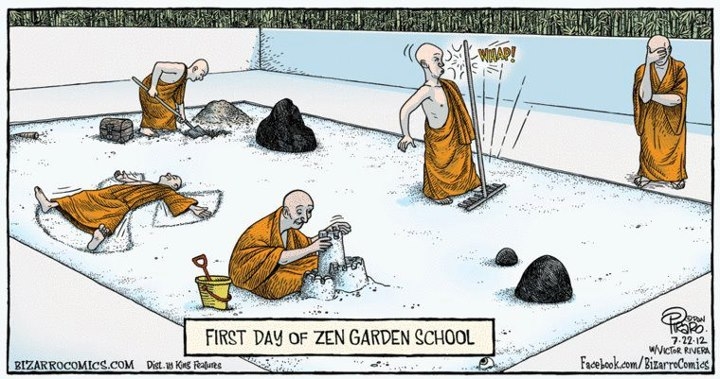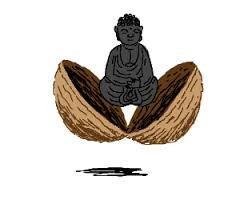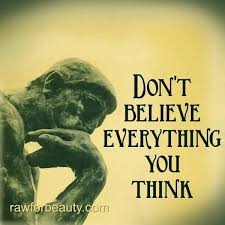Welcome home! Please contact lincoln@icrontic.com if you have any difficulty logging in or using the site. New registrations must be manually approved which may take several days. Can't log in? Try clearing your browser's cookies.
Treating the buddha as a philospher?
 Carameltail
UK Veteran
Carameltail
UK Veteran
in Philosophy
The raft to cross the river...
"My teaching is not a philosophy. It is the result of direct experience... My teaching is a means of practice, not something to hold onto or worship. My teaching is like a raft used to cross the river. Only a fool would carry the raft around after he had already reached the other shore of liberation."
The Buddha doesn't regard himself a philospher although he is sometimes treated as such.
" the Buddha should be seen not as a proponent of the philosophical methods of analysis and argumentation, but rather as one who sees those methods as obstacles to final release."
"is that he rejects the characteristically philosophical activity of theorizing about matters that lack evident practical application"
0

Comments
@Carameltail -- And your feeling about all this is???
Buddhism laced in philosophy strikes me as being a bit like sex using a condom: It's kinda-sorta like unprotected sex but not much comes of it. On the other hand, safe-sex philosophy is a lot less threatening and has all those 'sage' overtones that can, under the right circumstances, attract those with whom safe sex is desired ....
Just noodling.
OP, personally I think you're being a little bit overly concerned with a word. I would call that clinging.
Usually when people use the term philosophy in regard to Buddha, they are trying to differentiate from religion.
Perhaps the best light discussion of what philosophy is can be found here: https://www.philosophybasics.com/general_whatis.html
It seems to me that Buddhism fits pretty well there...as well as any other descriptor.
@Carameltail, what's your point?
Buddhism is a Religion based on philosophy, and a philosophy which embraces Buddhist religion.
And so...?
Hmm? My point is that some people may treat it as a philosophy that is one of clinging and day to day discussions. They may see no practical use, and is more an intellectual puzzle. If you have looked at how some people define philosophy this is seen. I have no clinging here, only talking about a reality for many, at least outside Buddhist circles. Often many people do intllectualise about the subject avoiding delving into it at all, just to seem clever.
I have no problems with the use of the word philosophy, day to day. If you look at philosophy in that context in relation to traditional western philosphers i am saying there are differences in what they try to achieve. In fact that is the case in other Eastern philosphies such as daoism. It is more a tool for a means that is based on the Buddhas direct experience. Which is important to consider, to not cling to views. It may have hints of what you could mark as a philosophy but it is different too.
Okay.
I see no practical point.
But okay.
Philosophy is just a word.
I didn't really use the word philosophy myself at least in the title. I am refering to the activity of endless philosophising instead of practical application. The state of being in the present and to be is what is favourable.
But i guess that doesn't ressonate with people here. Perhaps as no one does it so much as that.
It's just more labelling isn't it? Everything has to be defined, boxed, pigeonholed.
To me, Buddhism is my calling. No whistles, bells, ribbons and bows. It's just what I do.
I leave labelling to others. I merely view the flower.
I have read that study (could be philosophy) and contemplation without meditation is like being able to see but having no legs to go anywhere. Meditation without study (philosophy) and contemplation is like having legs but no vision to see.
to free the intellect our "philosophy" must self-implode
but without critical thinking and discernment, how will the veils of ignorance be wiped away?
Maybe we could better understand what you are trying to say if you gave us a really concrete example.
Personally, I think it's kind of a silly distinction since most philosophies in general have practical applications, whether in terms of logic, linguistics, existential issues, best ways of living, etc. And the point of most ancient philosophies was to utilize observation and/or reason to construct systems that, when put into practice, help us confront and overcome suffering. The Stoics and Epicureans were the most prominent and successful of Greek schools in this regard, and I feel that the Buddha is up there in terms of being a great teacher and constructing a pragmatically useful system of confronting and overcoming suffering. Some of their teachings are quite similar, as well, containing similar insights.
Stoicism, for example, focuses on self-control, detachment, virtue, reason, and finding inner peace by mastering human passion and emotions. For instance, I find Seneca's warning regarding "snares" in Moral Epistles to closely parallel that of the Buddha in MN 26, and his admonishment regarding food, clothing, and shelter closely parallels that of the Buddha in MN 2.
Epicurus' philosophy, on the other hand, was aimed at attaining ataraxia, peace of mind and freedom from fear, and aponia, the absence of pain, via a system of ethics, rational thinking/contemplation, and a secluded, moderate lifestyle. His hedonism wasn't so much unlimited indulgence in sensual pleasures as it was about balance or middle way. Epicurus himself held that the absence of pain was the highest pleasure (compare that to the idea of nibbana being the highest bliss a la Dhp 202-04), and he favoured static pleasure over dynamic pleasure. The difference is explained by Bertrand Russell in A History of Western Philosophy using hunger as an example:
This doesn't mean, of course, that you constantly stuff your face, but that you eat moderately, just enough to keep the body from experiencing the pain of hunger but not so much that it experiences the pain of overeating. In fact, Epicurus himself, contrary to popular belief, bordered on asceticism, renouncing sex and living off of little more than bread and cheese. The Buddha had a similar attitude towards food (among other things), as well. For example, from AN 4.37:
In the end, I don't think it's an insult or even incorrect to look at the Buddha as a philosopher. Rather, I'd say that his system of living is one born more from experience and observation than reason, although his teachings display a fair amount of the latter as well, and his love of wisdom shines through his teachings.
Another perspective. The Buddha wasn't a metaphysician, but he was a philosopher.
From my reading of the Pali Canon, it seems to me that the Buddha's teachings generally tend to avoid metaphysics, including ontology, in favour of a pragmatic approach to understanding mental stress and suffering (dukkha) and removing its causes (e.g., see MN 63). If anything, I'd say Buddhism is closer to something like process philosophy in Western philosophical terminology, where the focus is on processes or becoming rather than unchanging being or essence, e.g., Heraclitus vs. Plato; anicca + anatta vs. atman; or anything else that looks at change vs. essence.
Essentially (for those less familiar with these concepts), if something is impermanent, it means that it's subject to change, whereas that which has a permanent being or essence isn't. In other words, becoming (or any process of change) is only possible within the context of impermanence. In the examples I gave above, the former are examples of things dealing with processes or becoming, while the latter are things dealing with unchanging being or essence.
For example, Heraclitus, if we're to believe Plato, is famous for his idea that "everything flows," whereas Plato is famous for his idea of eternal forms. In the second example, the Buddha taught that what we mistakenly cling to as 'self' is really only impermanent phenomena subject to arising, changing, and passing away, whereas the Vedas and Upanishads are general understood to teach that our self is something real and eternal, something that is.
So strict ontology deals more with what inherently is or exists from its own side (i.e., being or essence), whereas the basic idea behind process philosophy is that what 'exists' is best understood in terms of processes rather than things or substances, and that change — whether physical, organic or psychological — "is the pervasive and predominant feature of the real." As such, it's sometimes called 'ontology of becoming.'
Of course, in Buddhism, becoming (bhava) refers more to the sense of identity that arises when there's clinging to one or more of the aggregates, but the basic idea is that our sense of self is a process of 'I-making' and 'my-making,' which I think can be classified as a type of process philosophy. The only area of metaphysics the Buddha does engage in is causality; but even here, he doesn't offer proofs so much as suggests that adopting these views in a pragmatic, common sense manner is empirically useful in the quest to end suffering. Hence, Buddhism avoids many of the metaphysical quandaries, including questions of ontology, that seem to plague other philosophical/religious traditions.
As @Jason shows, we can love-think, which I believe is the meaning of philosophy ...
Fortunately we can also think feel-Love. Take your Buddhas for the next dance ...
Who Am I has been the quest of many great philosophers of old

But they were none the wiser if.... "I" dare be so bold
They thought and thought and thought some more, ending back at where they started
Their minds got into a mental bind... their sanity departed
Then one day a young man called Siddhartha said "I've had enough'

"I'm gonna crack down on my thinking ...I'm gonna get real tough"
But in order for this to happen he had to first 'think about what to do
Hmm "How can I be rid of this monkey chat... my mind sounds like a zoo?"
So he thought and thought then thought no more, his thoughts came to an end

His intellect gave up the ghost, and.... he didn't go round the bend
He found 'thought' itself was the thinker and he could just sit and watch
And to his surprise this revelation turned his wisdom up a notch
Now he could use the thoughts as a tool to help all those in need
He used this 'love of wisdom' (philosophy) to implant this beneficial seed
The moral of this somewhat philosophical tale is when thoughts take the mind to the brink
Don't be fooled or charm by them...for you're 'not' what you think!
So......

The Hindu Vedantist Swami Vivekananda got it right: "The mind [he was referring to intellect] is a good servant and a poor master."
Yes, it's scary.
But that doesn't mean it's not true.
That's the thing practical application of a philosophy can be useful, while continuesly philosphising without practising and only words isn't so much. There are plenty if so called gurus who say big words but don't actually help people or even themselves. And endlessless seeking can become a form of attachment instead. Philosophy can be used just to impress people.
The thing is even the term philosophy for some can become one of attachment, (if you use it in a certain context) it should be a tool rather than something you worship or identify with.
Therefore while I may use the word philosophy sometimes, I prefer to use the word theory. I don't hold rigid views of the world, I rather let experience show me things. Theory is good once you find application from it but it is also important to experience things for yourself. It the end its a raft to cross the river.
There is a reason why he (the buddha) rejected a lot of philosophy, while he may have studied or known about some of it. For example there are some discussions based on unanswerable questions, perhaps on the nature of being, pondering on it can be fun but the use of it, is lacking. In addition, there are many discussions in philosophy which somewhat make sense as arguments on paper but make no sense in the real world.
That said there is some use in some of philosophy but not in the attachment sense.
He (the Buddha) was a philosopher in one sense that he did do some philosphising but his main purpose was as someone who wanted to help bring liberation of a sort, some would refer this as being a teacher or a healer. He did not regard himself as a philosopher even if others do, since he already let go of it but also perhaps to distance himself from traditional methods of reasoning and philosphising.
Though I can't know for sure ofc
Is Buddhism pragmatic? Does it work?
Yes.
Can it be used as a philosophy/religion/Self improvement/life changer/healing etc? Yes. Many ways to use ...
Om A Ra Pa Ca Na Dhih
... you might say ...
I realize that I'm as guilty as the next person, but don't we invest way too much into our over analyzation of Buddah and his teachings. I'm new, however in reading different teachers, what resonates the most is simplicity. I don't need to know how smart you are, or how much of the alphabet is after your name. I want to sense that you actually feel what you teach. Few can shed their pomposity or the superiority of their academic acomplishments. Though some can, and they're the ones who reach out from the page of written words to further you down along the path. Sorry @Carameltail I tend to stray from the discussion topic, but I like how theses Discussion posts point me somewhere. Really liking this place.
Always been fond of Epicurus, or at least the fragments that have survived of his ideas and lifestyle, his gentle wanderings through his garden with his lady friends, his view of living being a pleasant thing which seems to have enraged his fellow thinkers so much. Never has someone so harmless been so maligned! I feel the word philosophy puts people off (and some philosophers, who would put anyone off thinking for life!) but really it's just people having ideas and finding ways of being. The Buddha simply got it right
The Buddha certainly wasn't a philosopher as 'philosopher' is understood today but 'buddh-ism' - as the word reveals - is a philosophy.
It is a philosophy of life and being and as such it is not different from other philosophies because all deal with life and being. Since the different outlooks of different philosophies on life and being resonate differently with different individuals some become buddhists, others become materialists, idealists, humanists, nihilists, marxists, hedonists and what have you.
Buddhism can be applied as
1) a stand-alone philosophy, i.e. as a rational view and analytical framework,
2) a philosophy in combination with so called 'practices' or 'methods'
3) a philosophy in combination with so called 'practices' or 'methods' and religious beliefs.
And even though the term 'buddhism' implies 'philosophy' the ratio-analytical part can be completely ignored (thus ignoring also all ratio-analytical suttas and sutras) and it can be applied as
4) a stand-alone religion
5) a religion in combination with so called 'practices' or 'methods'
Different strokes for different folks.
Yes that is my Buddhism
Carefool @lobster it sounds like you are becoming attached

If all philosophies and religions are seen as equal then that's perfect.